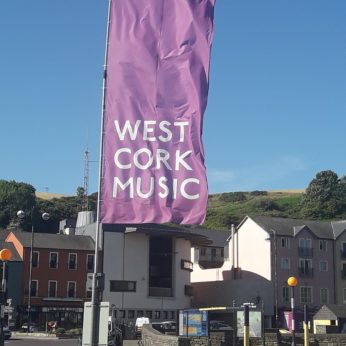Composer: Johann Sebastian Bach (b. 1685 - d. 1750)
Performance date: 04/07/2017
Venue: St. Brendan’s Church
Composition Year: 1720
Duration: 00:32:36
Recording Engineer: Richard McCullough, RTÉ lyric fm
Instrumentation Category:Solo
Artists:
Pieter Wiespelwey -
[cello]

The
opening of the Sixth Suite is like a blaze of light, gloria
in excelsis Deo sung
with all five voices in sublime celebration. The suite was originally
written for the Viola
Pomposa, a
five-string instrument with an added E string above the top A string
of the four-string cello. In modern times, it is most commonly heard
on four-string cello given the ease of projection in higher registers
on steel strings, however if one is lucky, one may enjoy the rare
privilege of a performance given on either a five-string or piccolo
cello. The melodic material is aurally fascinating – this is no
romantic beacon in the nightand the single instrument somehow sounds
like an entire orchestra exploding with acclamation.The Sixth Suite
Allemande is completely unlike the other five, played molto
adagio and
its character could be compared to that of the allemande of Bach’s
Violin Partita in B Minor in its prayer like contemplation of
impossible beauty. The Italian style Courante is virtuosic and
recalls the spectacular nature of the courante from the First Suite.
The sixth Sarabande is most loyal to the characteristics of the
sarabande – a work with no other emotion to express other than
grandeur and awesome beauty; a brief taste, in what we arrogantly
call real time, of the infinite. The ensuing Gavottes almost take the
listener by surprise as they are transported away from a brief
glimpse of another universe by the first gavotte – a dance of
forceful buoyancy followed by a wonderfully rustic second gavotte
challenging its performer but bringing the listener the utmost of
delight. Finally we have reached the last movement of the last suite.
The final Gigue is the longest of gigues and one of the longer
movements of the Cello Suites, almost as though the composer could
not bear to drag himself away from the creation of this masterpiece.
It is a final release of all tension, rustic in character yet
virtuosic in its use of double-stops, an extend range and challenging
melodic patterns. The frenzy of the dance culminates in a burst of
repeated sixteenth note pairs in a wild farewell to the glorious
domain of the Cello Suite.
Copyright © 2025 West Cork Music. All rights reserved.
Designed and developed by Matrix Internet